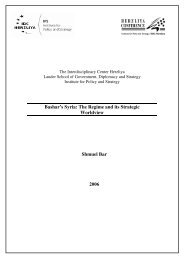Iran: Cultural Values, Self images and Negotiation Behavior
Iran: Cultural Values, Self images and Negotiation Behavior
Iran: Cultural Values, Self images and Negotiation Behavior
Create successful ePaper yourself
Turn your PDF publications into a flip-book with our unique Google optimized e-Paper software.
<strong>Iran</strong>: <strong>Cultural</strong> <strong>Values</strong>, <strong>Self</strong>-<strong>images</strong> <strong>and</strong> Negotiating <strong>Behavior</strong>dissimulation). All these are fertile ground for an exaggerated belief in premeditationin human affairs <strong>and</strong> the assumption that appearances, by definition, hide ulterior <strong>and</strong>dark motives. It should be noted, though, that the widespread tendency to blame themachinations of foreign powers for everything that went wrong with <strong>Iran</strong> onlydeveloped to its present scope since the middle of the nineteenth century. It wouldseem, therefore, that the history of foreign machinations <strong>and</strong> intervention in modern<strong>Iran</strong>, <strong>and</strong> the sense that the <strong>Iran</strong>ian nation has been cheated out of its proper placeamong the nations, have provided the “factual” material for many of the extantconspiracy theories.The <strong>Iran</strong>ian proclivity towards acceptance of conspiracy theories provides readyexplanations for a reality that is perceived as unjust, <strong>and</strong> a collective defensemechanism in times of national weakness <strong>and</strong> humiliation. At the same time, itengenders a fatalistic <strong>and</strong> defeatist mentality, a deep suspicion towards any gesture,<strong>and</strong> an unwillingness to believe in simplicity of motives <strong>and</strong> statements. The belief inconspiracies also renders <strong>Iran</strong>ians receptive to implicit threats even over <strong>and</strong> abovethe actual credibility of the threat. This is especially true when the source of the threatis the U.S. or Israel. The popular image of these two archenemies of the regime ascountries having no constraints in military action feeds the fires of rumor <strong>and</strong> masshysteria whenever such a threat is on the table.PragmatismHeroic suicidal dogmatism is not a characteristic of <strong>Iran</strong>ian political culture. On thecontrary, pragmatism <strong>and</strong> Realpolitik have been hallmarks of the <strong>Iran</strong>ian worldview<strong>and</strong> traditional Shiite doctrine. <strong>Iran</strong>ians are acutely aware of the consequence of forceratios, be they political, economic, or military. One sociological-anthropological studyprepared in the 1950s asserted “[the <strong>Iran</strong>ian] must preserve a front for outsiders to see.He will fight for his honor… but only according to his assessment of the probabilityof winning,” 56 <strong>and</strong> “a Persian admires dead heroes, but he ordinarily has no desire tobecome one immediately.” 57 Therefore, <strong>Iran</strong>, as a nation, has responded to threats in apragmatic way, railing against the lack of justice in the way that stronger powers takeadvantage of their superior strength, but reacting according to a sober reading of thesituation. 58This conspicuous characteristic is linked to the Shiite historic narrative. The Imam‘Ali, according to the Shiite narrative, conceded his right to the Caliphate in order topreserve the unity of the Muslims, <strong>and</strong> when he became the fourth Caliph, went in tonegotiations with Mu’awiya in order to avoid further bloodshed. Similarly, his sonHassan, who succeeded him for half a year, in the end ceded to Mu’awiya. The factthat both these cases ended in disaster has not de-legitimized the principle ofpragmatic negotiation of conflicts. ‘Ali’s second son, Hussein, however, symbolizesheroic self-sacrifice; he led an insurrection <strong>and</strong> was killed at Karbala. Khomeinihimself referred to this duality in declaring himself “a Husseini, not a Hassani.” Inpractice, however, Khomeini let the die fall on the side of a Hassan-like pragmatism56 Herbert H. Vreel<strong>and</strong>, ed. <strong>Iran</strong> (New Haven, CN: Human Relations Area Files, 1957): 7.57 Vreel<strong>and</strong> 858 One of the best instances is the <strong>Iran</strong>ian reaction to the American deterrence during the "tanker war"during the Iraq-<strong>Iran</strong> War. <strong>Iran</strong> realized that attacking American ships would be a political <strong>and</strong> militarymistake, no matter how just it seemed, <strong>and</strong> refrained from further attacks.14
















